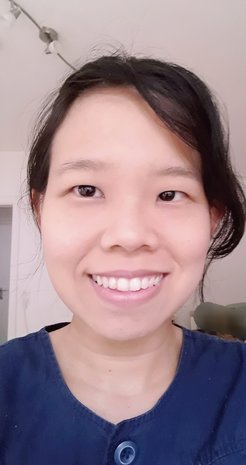From childhood stories to science
Interview with former PhD student and early-career researcher Yoshinta Setyawati
In the past year, Yoshinta Setyawati was in a state a little like quantum mechanical superposition: Finishing her PhD as part of Independent Max Planck Research Group “Binary Merger Observations and Numerical Relativity” and at the same time, working as a postdoc at Utrecht University. In this interview, she talks about her research on gravitational waveforms and what keeps her going onward.
Yoshinta, why did you become a physicist?

I like physics! I am curious and always thrive on challenges. When I was a child, I dreamt of becoming a scientist. I heard many stories about the big questions of our universe, like black holes or if anything could move faster than the speed of light. These encouraged me to lean into physics. However, the physics research community is not well developed in my home country, Indonesia. This situation motivated me even more to study physics at the Max Planck Institute for Gravitational Physics as one of the leading institutes in the field. A challenge I met.
What are you researching?
My research focuses on gravitational-wave data analysis. With the first direct detection of gravitational waves in 2015, scientists accomplished great possibilities to test Einstein’s theory of general relativity. Since we observe more and more gravitational waves – at the moment we are at 90 detections – we can also learn more and our science gets more precise. With this number of signals, we can test general relativity from many different angles.
And on a more specific level?
On a more specific level, I aim to improve the theoretical modeling of gravitational waveforms. To analyze data from the observatories, we use models from theoretical predictions to distinguish between true signals or just random noise. There are a lot of scientists working to improve this process, as the detections depend on the theoretical modeling. In my PhD studies at AEI Hannover, I was also part of this collaborative work for the current detectors, LIGO, Virgo, and KAGRA. My focus was to speed up how we calculate waveforms from theory I also investigated how the gravitational wave would look like if its source had some additional parameters.
Now at Utrecht University, I am still working on the gravitational-wave models but shifted my focus. Instead of improving data analysis for the current detectors, I am investigating improvements for future gravitational-wave detectors. These will be even more sensitive, measuring signals from galaxies further away. To make use of that incredible potential of sensitivity, we are already starting to think of methods to adapt our current strategies for the future.
What are your most memorable moments of your PhD?
There is not one specific moment, but a lot of encouraging encounters. For example, the conferences, that shaped my scientific progress. At such conferences I get motivation or inspiration for new projects, learn from different people, and discuss with a wide audience. I fondly remember a LIGO Scientific Collaboration conference. It was the first time I presented a poster and immediately won a poster price – no wonder that I kept that in good memory!
Also remarkable was my visit to the gravitational-wave detector GEO600 in Hannover. It was fascinating to visit one of the detectors. On-site, a PhD student gave me a tour around and showed me the details behind the scenes.
During my studies, I had the chance to work with other PhD students during the lecture weeks of our International Max Planck Research School. The event brought together different doctoral students – some experimental working scientists and some like me, doing data analysis. Together, we worked on a project about future detectors. How could we improve them? What kind of sources could we ‘see’ with better sensitivity?
In the end, being a gravitational-wave scientist is a unique opportunity. It is very challenging to develop a new model that offers a better solution than the existing ones. I enjoy doing research, reading literature, understanding the problems, and coding up my solutions. My passion for excellence is what wakes me up in the morning. Sometimes, I even sleep not more than a few hours, just because I am so excited to go on.












